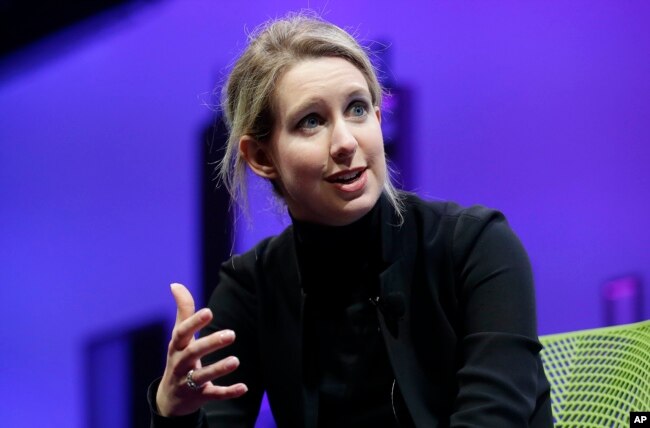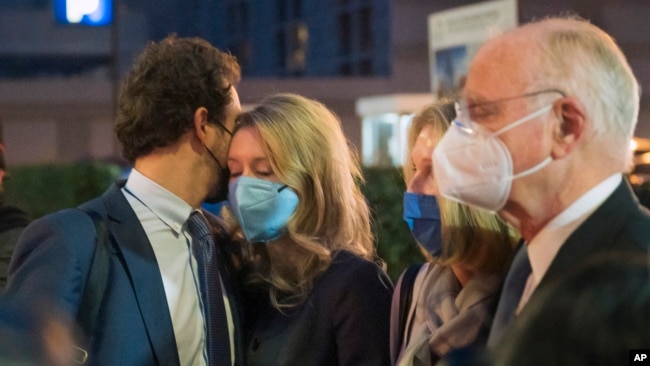血液一滴から・・・すごい時代が来たんだ〜!!と驚きのこのニュースを聞いた記憶があります。それが実は・・・さらに驚きです!!
金はさらに金を求め、名声と脚光を求めるならず者を求める。
アイデアが巨万の富をもたらし、英雄になるはずだった、”成功ストーリー”は”転落のストーリー”へと塗り替えられた。
人間の本質を見せつけられた気がします。一攫千金は人間の憧れなのですね。
VOAで英語を学び、世界を見つめましょう!!
セラノス事件でシリコンバレーの文化は変わるか?(和訳)
Will Theranos Case Change Silicon Valley's Culture?
January 07, 2022
観測筋は、セラノスの元責任者エリザベス・ホームズの裁判は、テクノロジー産業が製品やサービスを押し付ける方法に懸念を抱かせるものだと述べています。
この注目の裁判は、テクノロジー産業の中心地であるカリフォルニア州のシリコンバレーと呼ばれる地域とその手法に多くの関心を集めています。
ホームズは月曜日、11件の詐欺容疑のうち4件で有罪判決を受けました。彼女は、セラノスが画期的な新しい医療機器を開発したと投資家を騙したとして起訴されていました。同社の関係者によると、この装置は、人の指から採取した少量の血液から多くの種類の病気を発見することが可能であるとしていました。
現在、ホームズはそれぞれの罪状で20年の刑に服する可能性があります。しかし、法律の専門家は、彼女がそれほど長く服役することはないだろうと言っています。
陪審員の有罪判決が、シリコンバレーの考え方を変えることになると予想する専門家はほとんどません。テクノロジー業界は長い間、大きな約束をすることで成功に達してきました。
ホームズの裁判結果は、”CEOたちに対して、度を超すと結果が出るというメッセージを送ることになるでしょう。”とエレン・クライツバーグ氏は言います。彼女はサンタクララ大学の法学教授です。しかし、彼女は、「投資家はやはり、有望なアイデアでもっと儲けたいと思うでしょう。」と述べています。
連邦弁護団は裁判の中で、ホームズは名声と金にしか興味のない詐欺師であると述べています。ホームズの弁護団は、彼女は男性が支配する業界で活動する非常に才能のある女性で、かつての恋人でありビジネスパートナーでもあったサニー・バルワニさんから精神的、性的虐待を受けたと述べています。
この裁判は、シリコンバレーで成功した企業で使われている "fake it 'til you make it "”成功するまで成功しているフリをしろ”と呼ばれるビジネス手法の弱点を明らかにしました。その考え方は、Google、Netflix、Facebook、Appleといった企業の創業に貢献しました。
ホームズは2003年、19歳のときにセラノスを創業しました。彼女は2018年に連邦犯罪で起訴されました。
その間、ホームズは無名の人物から、45億ドルの評価を受けるシリコンバレーのスターになりました。彼女の転落の物語は、ドキュメンタリー映画や書籍、ポッドキャストで語られ、まもなくテレビシリーズになる予定です。
ホームズは、何百もの病気や健康問題を調べるのに、より簡単で、より痛くなく、よりコストのかからない方法を作ろうと考えました。彼女の製品は、従来の血液検査とは異なり、人の指から数滴の血液を採取します。クエスト・ダイアグノスティックス社やラボコープ社などの検査会社が支配する業界を変えようとしたのです。
ホームズは、まず全米のウォルグリーン薬局とセーフウェイ食品店に小さなラボを作ることを提案しました。このラボでは、セラノスの小型装置 Edison エジソンを使って、素早く簡単に血液検査を実施します。
このアイデアと、ホームズのプレゼン方法は、新会社で儲けようとする投資家を興奮させました。ホームズはセラノスが実業家のルパート・マードックやウォルマートのオーナーであるウォルトン家などの投資家から9億ドル以上の資金を調達するのを手伝ったのです。

FILE - Elizabeth Holmes, founder and CEO of Theranos, speaks at the Fortune Global Forum in San Francisco, Nov. 2, 2015.FILE - 2015年11月2日、サンフランシスコで開催されたフォーチュン・グローバル・フォーラムで講演するセラノス社の創業者兼CEO、エリザベス・ホームズ。
当時、ほとんどの人が知らなかったのは、セラノスの血液検査技術が誤った結果を出していたことです。
その後、セラノスは密かに患者の血液を従来の機械を使って従来の研究所に送っていました。裁判で示された証拠では、セラノスが米軍やファイザーなどの製薬会社と交わしたと思われる取引について、ホームズが嘘をついていたことも判明しました。
同社は、The Wall Street Journal紙の調査・報道により、同社の技術に危険な問題があることが判明し、破綻しました。
公判中、ホームズ被告は自分のやり方について、時折、悲しみをあらわにしました。しかし、政府側の弁護士が持ち出した重要な出来事のいくつかは、忘れてしまっていたと言いました。彼女は、セラノスが技術を向上させるという信念を捨てなかったと言っています。
彼女は、2009年から2016年までセラノスの最高執行責任者だったときに密かに一緒に暮らしていたバルワニを責めました。
ホームズは、バルワニが解決を約束した実験室の問題に対処することができなかったと述べました。また、彼女が何を食べ、いつ眠り、誰が友達かをコントロールしながら、彼女を虐待していたと非難しています。さらにホームズは、セラノスを立ち上げる前のスタンフォード大学在学中に、正体不明の人物にレイプされたことがあるといいます。
Will Theranos Case Change Silicon Valley's Culture?
Observers say the trial of former Theranos chief Elizabeth Holmes raises concerns about the way the technology industry pushes its products and services.
The closely watched trial has brought a lot of attention to the area in California known as Silicon Valley, a technology industry center, and its methods.
Holmes was found guilty on Monday of four of 11 charges of fraud. She had been accused of tricking investors into believing that Theranos had developed a revolutionary new medical device. The device, company officials said, was able to find many kinds of diseases from a small amount of blood taken from a person’s finger.
Now, Holmes could serve 20 years in prison for each charge. Legal experts say she is unlikely to serve that long, however.
Few experts expect the jury’s guilty decision to change the Silicon Valley way of thinking. The technology industry has long reached success by making big promises.
Holmes' trial result “will send a message to CEOs that there are consequences in overstepping the bounds,” said Ellen Kreitzberg. She is a law professor at Santa Clara University. However, she said, “Investors are still going to want to make more money on a promising idea.”
Federal lawyers said during the trial that Holmes was a fraud only concerned with fame and money. Holmes’ defense lawyers said she was a very gifted woman operating in an industry controlled by men, who was emotionally and sexually abused by her former lover and business partner, Sunny Balwani.
The trial showed the weaknesses of the business method used by some successful Silicon Valley companies known as “fake it ‘til you make it.” That idea helped start companies like Google, Netflix, Facebook and Apple.
Holmes founded Theranos in 2003 at the age of 19. She was charged with federal crimes in 2018.
During that time, Holmes went from an unknown person to a Silicon Valley star who was valued at $4.5 billion. The story of her fall has been told in documentary movies, books, podcasts and will soon be a TV series.
Holmes set out to create an easier, less painful and less costly way to look for hundreds of diseases and health problems. Her product took a few drops of blood from a person’s finger unlike traditional blood tests. She aimed to change an industry controlled by testing companies like Quest Diagnostics and Labcorp.
Holmes proposed starting with small labs in Walgreens drug stores and Safeway food stores across the U.S. The labs would use a small Theranos device called the Edison to run fast, easy blood tests.
The idea — and the way Holmes presented it — excited investors hoping to make money on a new company. Holmes helped Theranos raise more than $900 million from investors like businessman Rupert Murdoch and the Walton family which owns Walmart.
What most people did not know at the time was that Theranos’ blood-testing technology produced incorrect results.
Theranos then secretly sent patients’ blood to traditional laboratories using traditional machines. Evidence shown at the trial also showed that Holmes lied about supposed deals that Theranos had reached with the U.S. military and drug companies like Pfizer.
The company collapsed after an investigation and reporting from The Wall Street Journal newspaper found dangerous problems in the company’s technology.
During her trial, Holmes sometimes expressed sadness about the way she had done things. But she said that she had forgotten about some of the important events brought up by government lawyers. She said she never stopped believing that Theranos was going to improve its technology.
She blamed Balwani, who she secretly lived with while he was Theranos’ chief operating officer from 2009 to 2016.
Holmes said that Balwani failed to deal with the laboratory problems that he had promised to fix. She also accused him of abusing her while controlling what she ate, when she slept and who her friends were. In addition, Holmes said she had been raped by an unidentified person while still studying at Stanford University before starting Theranos.
Words in This Story
fraud— n. the crime of using dishonest methods to take something valuable from another person
consequence — n. (often pl.) something that happens as a result of a particular action or set of conditions
bounds — n. the area in which a game (or a rules-based activity) is played
fake — adj. not real or true; false
